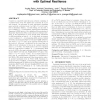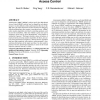83 search results - page 10 / 17 » Efficient Two-Party Secure Computation on Committed Inputs |
PODC
2009
ACM
14 years 8 months ago
2009
ACM
Consider a completely asynchronous network consisting of n parties where every two parties are connected by a private channel. An adversary At with unbounded computing power activ...
CRYPTO
2006
Springer
13 years 11 months ago
2006
Springer
We present the first universally verifiable voting scheme that can be based on a general assumption (existence of a non-interactive commitment scheme). Our scheme is also the first...
PKC
2010
Springer
13 years 11 months ago
2010
Springer
In many practical settings, participants are willing to deviate from the protocol only if they remain undetected. Aumann and Lindell introduced a concept of covert adversaries to f...
STOC
2007
ACM
14 years 8 months ago
2007
ACM
A zero-knowledge proof allows a prover to convince a verifier of an assertion without revealing any further information beyond the fact that the assertion is true. Secure multipar...
CCS
2007
ACM
13 years 11 months ago
2007
ACM
Administrative RBAC (ARBAC) policies specify how Role-Based Access Control (RBAC) policies may be changed by each administrator. It is often difficult to fully understand the effe...




